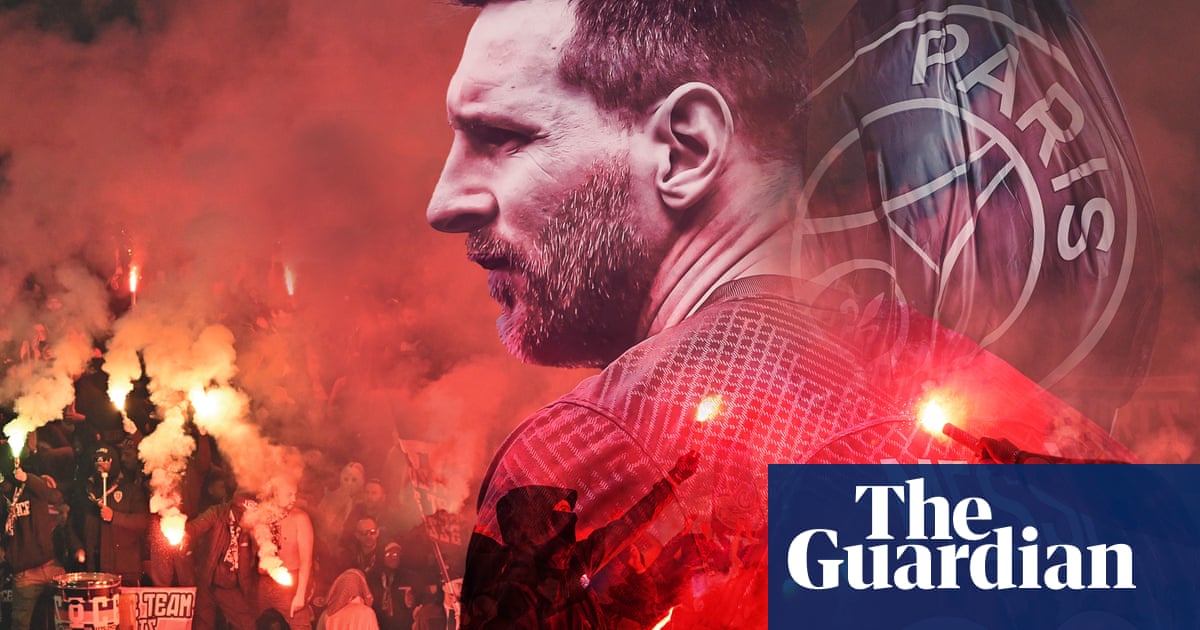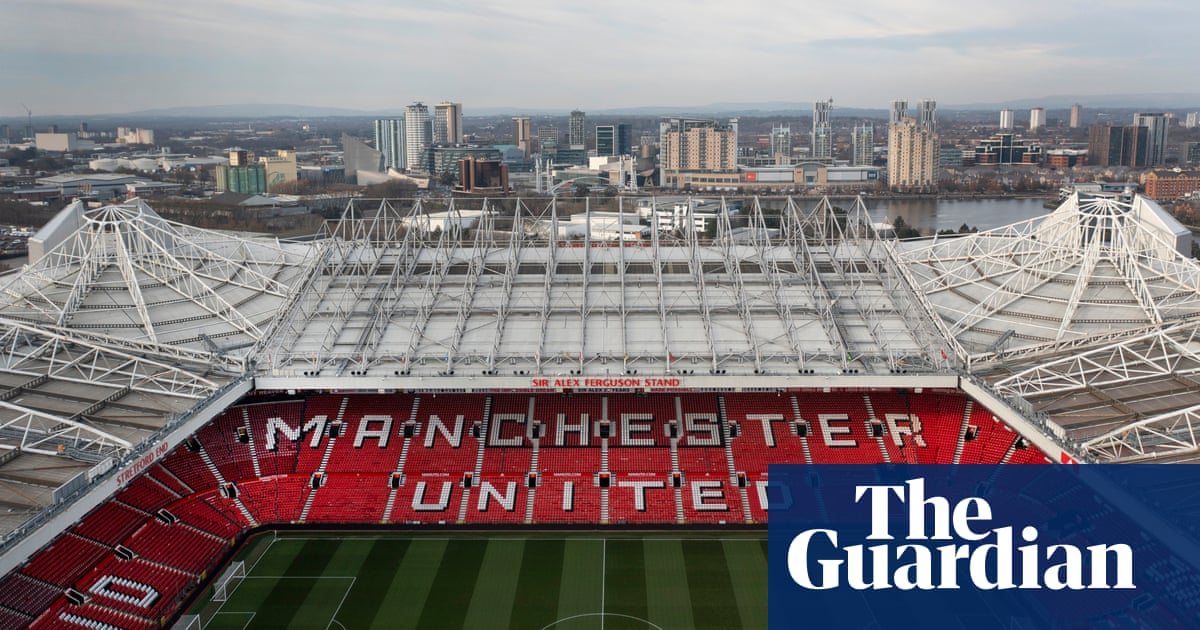
So this is how the end comes. Not with a bang. Not with a whimper. Not with a potentially decisive Ligue 1 double header against Troyes and Ajaccio. But instead with a trail of politically weaponised, oddly touching tourist photos.
Here is Lionel Messi staring at a falcon. Here is Lionel Messi looking confused next to a fence. Here is Lionel Messi interacting cautiously with a horse. Here, beyond the staged and clipped images, is an exercise in proxy war and geopolitics as expressed through the late-season schedule of an exceptionally talented 35-year-old converted winger.
There is an obvious absurdity around events in the life of Lionel Messi this week, five days spent inside the deliciously potent nexus between Paris, Doha, Jeddah, the Parc des Princes and the Saudi Tourism Authority.
But there is also a note of deep foreboding here for anyone who cares to look a little closer. The background noise just beneath all this is not just laughter or indifference (although it is also both of these things) but a sense of clarity, a tea-leaf reading of the immediate future. Here is Messi in holiday shorts controversially petting an alpaca, an iconography of modern political power.
More immediately there is a massive, clanging heavily signposted warning here for English football, and for supporters of Manchester United in particular. Perhaps someone, somewhere in the halls of government, the Premier League or the Football Association might even glance across and feel a stab of unease at the way propaganda and carbon politics have transformed the French domestic league, still the world’s greatest talent factory, into a grotesque sporting pantomime. For now this thing will continue to play out right in front of us. Lionel Messi on holiday: a warning from history.
The details have already been widely recounted. Paris Saint-Germain’s players had a scheduled day off on Monday this week. Instead the manager, Christophe Galtier, announced an emergency training session after the 3-1 defeat at Lorient.
Messi, however, was already en route to the Gulf, there to fulfil his prearranged obligations as Saudi Arabia’s chief celebrity tourism ambassador. It was too late to return in time. On Wednesday the world’s highest-paid footballer was duly suspended for a fortnight, ruling him out of two of the remaining five Ligue 1 games before his contract expires in the summer. On Friday he apologised, for what it’s worth.
It is of course the Qatar-Saudi element here that elevates this beyond the standard big ego player wrangles. Messi signed his $25m agreement to act as a kind of ambling hype-man for the house of Saud last year. It is still hard to believe that the state of Qatar didn’t raise serious objections to its own chief sporting outreach tool simultaneously draping himself in the flag of one of their most awkwardly intertwined regional rivals.
Neighbourly relations have improved from the blockade years, when Saudi took the lead in erecting a regional boycott of their eastern neighbour. But Qatar remains a super-charged minnow, a blob at the edge of the Arabian peninsula, top-heavy with carbon wealth. Here is a nation of 350,000 that might, some analyses have suggested, already have been subsumed or semi-annexed were it not for its massively enhanced international status over the last 15 years, driven most visibly in the western eyeline by last years’s Fifa World Cup (star turn: Lionel Messi).
It felt like a major hands-across-the-scrub moment when Mohammed bin Salman was seen hobnobbing with Sheikh Tamim bin Hamad al-Thani at Qatar 2022’s opening game. But Saudi is still the big brother here. It still seems likely Messi will be whisked away at the season’s end by the Saudi league, with talk of a laughable £350m-plus deal to play dictator one-upmanship-ball in the kingdom.
There is always a price to pay in these familial power struggles. The pictures of Messi smiling next to livestock were pumped out by the Saudi Tourism Authority just hours after news of his PSG ban. You can have your World Cup, your celebrity runway show in Paris. But we will also dip our beak. Here we have the carbon state football power-play equivalent of Tony Soprano agreeing to let it go this time, but taking your jacket and making you walk home just so that you know.
In the meantime there are so many wider strands that flow from this nation-state psychodrama. First it is hard not to feel some admiration for Messi’s basic ruthlessness in his dealings with his employer. The accepted narrative of his time at PSG is that it has been a failure. The team have got worse rather than better. Throwing another hall-of-famer into the mix has turned out – who knew? – to be an act of high-priced sporting vandalism. There is something darkly reassuring here. Chuck all the money in the world at this thing. It will also require heart and spirit and skill to bend it to your will.
Plus of course for Messi as sole trader, tender of his own legend, the move to PSG has in fact been gloriously successful. Basically French football has been his springboard to a career-defining World Cup win, essentially a massive-money 18-month training session for Qatar 2022. For the first time he arrived at a tournament last year not exhausted, not beaten down by a fibre-twanging club season, with minutes saved here and there as PSG strolled through the domestic autumn.
For all the talk of a tailing off Messi has still scored 41 goals in 50 games for club and country this season, while also making just four headers and one interception in Ligue 1. The move gave him just enough in the way of action, plus $90m and the Fifa World Cup, the final gloss on his personal legend. I will wear your bisht and say thank you. But we’re done here now.
Plus of course there is a massive cautionary lesson for the Premier League here, and for all hungry European clubs with borrowed money to spend. It didn’t take any great powers of deduction two summers ago to see that signing either the aged Cristiano Ronaldo or the aged Lionel Messi was a terrible move, that this would inevitably be a case of poisoning the wells, of vomitous celebrity abasement, of likes, eyeballs and monarchical bragging rights devouring notions of team-building or robust competitive sport.
This week there was even a story that Neymar – remember him? – is being touted about the place again, that he could become a kind of human welcome basket should a highly connected Qatari succeed with its cash bid for Manchester United.
This direction of travel should be a source of genuine concern for Manchester United’s support. The PSG blueprint is right there. Is this really what you want? Announce Mbappé. Announce Dwayne “The Rock” Johnson. Announce glitz, decay and an inner dwindling.
“Paris Saint-Germain condemns in the strongest possible terms the intolerable and insulting actions from a small group of individuals that took place on Wednesday.” The words, there, of Paris Saint-Germain this week, describing the actions of their own fans in protesting noisily outside Neymar’s suburban mansion. Although presumably this is at least good news for Neymar’s neighbours. With the chanting mob perhaps drowning out the sound of the loud music everyone keeps complaining about, an angry Parisian Ultra version of noise-cancelling headphones.
Chuck in problems with the stadium (which the city of Paris does not want to sell for redevelopment), plus the wandering eye of the owners, plus the laughable Caesarian power of “Kylian Saint-Germain”.
This is a soul-sick institution, a place that seems constantly to be trying to invent an emergency internal culture, while simultaneously pouring hot lava over all that with stupid signings, brand-puffs, the release of the latest exciting new NFT, sandwiched between absent superstars and an increasingly rage-gripped fanbase. PSG are five points clear at the top of the French league. PSG are also, arguably, the unhappiest football club in Europe.
There is, of course, a note of warning in all this for the Premier League more broadly, which could before long find itself employed as a foreign policy outreach arm at one remove – we remember those “legally binding assurances” – for three separate sovereign states, Abu Dhabi, Saudi Arabia and Qatar.
Welcome to the era of the proxy war, of soft-power struggle expressed through these delicate and much-cherished sporting institutions. Is this really healthy, whoever the participants might be?
As it happens all three of these nations have dubious human rights records. All have a line directly in to the UK government. Two have already been charged by the football authorities, in the case of Abu Dhabi and Qatar, with amusingly carefree breaches of financial restraints, which are clearly not part of the long-term plan.
How is this thing going to look five years from now? The saga of Messi, Paris and the gazelle-petting session may look like a cartoon strip at the edge of things, a random entanglement of supernova star and power-hungry state. But look a little closer and it is also a perfect little miniature, the present and the future captured in the same roll of heavily weaponised holiday snaps.












